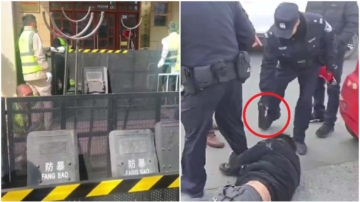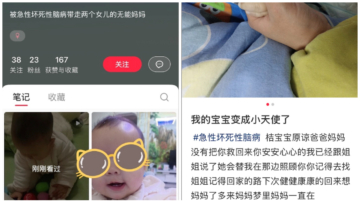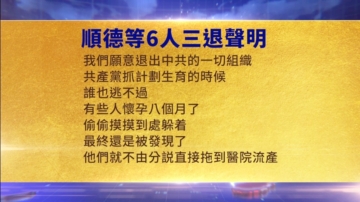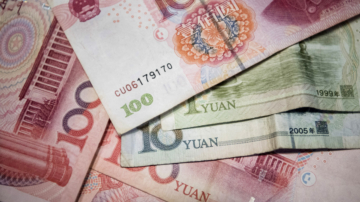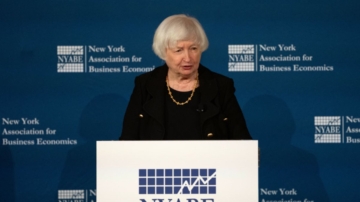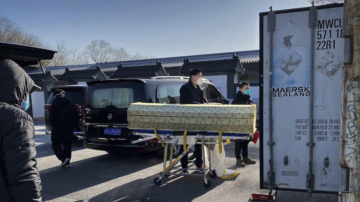【新唐人2014年08月07日讯】继上个月底美国电脑软件巨头“微软公司”在北京、上海等办事处遭中共当局调查之后,8月4号,跨国汽车公司“奔驰”(Mercedes-Benz)位于上海的办事处,也面临反垄断调查。而“克莱斯勒”(Chrysler)和“奥迪”(Audi)两家企业,已被查明存在垄断行为,将接受相应的处罚。为何近来外资企业在中国大陆被相继出事,一起来看看下面的报导。
4号上午10点多,国家发改委反垄断调查小组突击了“奔驰”上海办事处,多名高管被约谈,多台电脑遭强制检查。
知情人士透露,发改委这次调查直指“奔驰整车价格和最低限价的经销商政策”。
据了解,就在调查的前一天,8月3号,“奔驰中国”宣布,从9月1号起,维修配件价格平均下调15%。这是“奔驰”继7月后,第二次调低售后维修价格。
业内人士分析,“奔驰”遭突击调查有两种可能,一是发改委对“奔驰”的降价声明不满意,二是“奔驰”在反垄断之外触碰了其他禁区。
4号,国家工商总局也对“微软”采取最新行动,公开警告“微软”不得阻碍中共当局的反垄断调查。“微软”7月28号曾遭突击调查。
工商总局宣布,已对“微软”全球副总裁玛丽•斯纳普女士(Mary Snapp)等人,进行反垄断调查询问。
《新唐人》特约经济评论专家杰森•马:“我倒不觉得,现在中共打出这个反垄断牌子,是因为针对美国对它的网络间谍的报复,它针对的不光是高通、微软这样的美国公司,它也针对德国的汽车公司,而且它自己声称,是得到一些企业的举报。中共现在整体经济发展乏力,国外的企业已经很依赖于中国这个市场,它有能力以自己的市场要胁,打压一下海外的企业,扶持中国自身的企业。”
在此之前,发改委曾针对世界上最大的手机芯片制造商“高通公司”发起反垄断调查,“高通”被指控滥用市场支配地位非法牟利,面临超过10亿美元的罚款。
此外,官方证实,上海市发改委对“克莱斯勒”,以及湖北物价局对“奥迪”的调查已接近尾声。这两家企业近期将受到相关处罚。
杰森•马:“跟中共走的很近的腾讯,它在微信上的垄断是一目了然的,还有中石油、中石化、中海油,电信企业,银行业,都是地地道道的垄断运作方式,海外的这些企业,事实上占的市场份额并不大,而且都是靠技术领先,创造优势,比如高通的晶片,对它专利的购买,这样的因素是全世界都认可的一件事,但是中共为了扶持自己的手机产业,用这样的方式让高通让利。”
美国“南卡罗莱纳大学艾肯商学院”教授谢田认为,这些外资企业在中国,根本谈不上垄断,中共最近对这些企业的举措,体现了目前中共高层内斗非常激烈。
美国南卡罗莱纳大学艾肯商学院教授谢田:“中共同时对德国、美国,其他好几个国家的不同类型、不同行业的公司同时出击,显然不像是一个纯粹的经济上或商业上的行为,更像是一种政治行为。换句话说,就是在中共现在内斗非常疯狂、非常激烈的情况下,很可能涉及到某一派的人,从某一些外国公司的合作中获益,而导致另一派人现在开始反攻。这是中共政治上内斗的反映,而不是一个商业的或反垄断的行为。”
4号,美国《芝加哥论坛报》报导,全球食品加工商“福喜集团”位于上海的工厂,被媒体披露出售过期变质肉类的例子,提醒人们,在一个专制国家做生意是多么棘手。
报导说,中共是一个难以预测的合作伙伴,因为没有权力制约。“共产党”控制着一切,从食品安全检查系统到司法,从新闻机构到社交媒体。因此很难预测,在任何一个时刻,政府将如何行动,因为任何政治考虑,都可能影响情况。
采访/陈汉 编辑/陈洁 后制/李勇
What's The Reason Foreign Companies Are Consistently Investigated In China?
Since last month, the US software giant Microsoft
was investigated by China's regulator on August 4 in Beijing,
Shanghai and other cities.
Mercedes-Benz in Shanghai also faced
a "monopoly" investigation.
Car maker Chrysler and Audi have committed
"monopolistic behavior" and will be punished soon.
Why do the foreign companies in China
consistently face problems?
Let's take a look.
China's regulator raided a Mercedes-Benz office
in Shanghai on August 4.
Several senior officials have been questioned
and many computers have been forcibly inspected.
Sources reveal that the regulators directly investigated
Mercedes-Benz's car prices and its lowest price policy.
On Aug. 3, Daimler announced that from Sept. 1, it would cut
the cost of spare parts 15 percent for its Mercedes cars in China.
This is the second time since July the company
made cuts after-sale maintenance price.
Experts analyze that there were two possibilities
for Mercedes-Bens being faced with sudden raids:
The regulators were not satisfied with the price cuts
Mercedes-Benz made;
Mercedes-Benz has touched forbidden areas
apart from "anti-monopoly."
On Aug. 4, China's State Administration for Industry
and Commerce (SAIC) has been investigating Microsoft.
SAIC warned Microsoft not to interfere in the investigation.
On July 28, Microsoft faced sudden raid by regulators.
SAIC said that they have carried out an anti-monopoly
investigation into Vice President Mary Snapp and other Microsoft staff.
Jason Ma, NTD Television guest economic commentator:
"I don't think anti-monopoly is to seek revenge against
the US's cyber espionage incident,
because this action is not only aimed at Qualcomm
and Microsoft, German car makers are also included.
The Chinese regime also claimed they received
complaints from some companies.
China's entire economic development is weak
and foreign companies have relied on China's market.
Thus China takes advantage of its market
to blackmail and attack the foreign companies.
This is in order to support its domestic companies."
Earlier, China's regulator has investigated into US chip-maker
Qualcomm's "monopoly."
Qualcomm was alleged of abusing its market position
and gain illegal profits in China.
Qualcomm could face a fine of over $1 billion.
China's authority confirmed that investigation into Chrysler
in Shanghai and Audi in Hubei Province nearly complete.
The two companies would face a fine soon.
Jason Ma: "Tencent Holding Limited follows the Chinese
Communist Party (CCP) closely.
People can tell that Tencent is the monopoly
of WeChat.
PetroChina, Sinopec, CNOOC, telecommunication
companies, and banks certainly are monopolies.
The foreign companies actually haven't taken up
a large percentage of the market in China.
These companies lead the market with its advanced
technology, establishing advantages.
For example, customers need to purchase Qualcomm's chip
patent, this is recognized around the world.
However, the CCP wants to support its mobile phone industry,
using this way to force Qualcomm to profit share."
Frank Xie, Professor at University of South Carolina Aiken
believes these foreign companies in China cannot
be classified as monopolies.
The CCP's actions manifest that its internal struggle
became very intensified.
Frank Xie: "The CCP raided German companies at the same
time as the US and other countries on different products and
sectors in China, which obviously did not look like a purely
economic or commercial action but rather a political action.
In other words, the CCP internal struggle has intensified,
it is possibly related to people in one faction who obtained
benefits from joint-venture companies.
It caused another faction to counter attack.
It is a reflection of the CCP's internal political struggle,
but not a commercial or anti-monopolistic action."
On August 4, the Chicago Tribune reported that a global
food company OSI Group's Shanghai plant reportedly sells
expired meat.
Chicago Tribune reminded its readers that "it's tricky
to do business in an authoritarian state."
The report says that China "is an inherently unpredictable
partner because there are no checks on power.
The CCP controls all, from the food safety inspection system
to the judiciary, fom news organizations to social media.
So it's difficult to anticipate how the government will act
at any given moment, because political considerations
can influence any situation."
Interview/ChenHan Edit/ChenJie Post-Production/LiYong
4号上午10点多,国家发改委反垄断调查小组突击了“奔驰”上海办事处,多名高管被约谈,多台电脑遭强制检查。
知情人士透露,发改委这次调查直指“奔驰整车价格和最低限价的经销商政策”。
据了解,就在调查的前一天,8月3号,“奔驰中国”宣布,从9月1号起,维修配件价格平均下调15%。这是“奔驰”继7月后,第二次调低售后维修价格。
业内人士分析,“奔驰”遭突击调查有两种可能,一是发改委对“奔驰”的降价声明不满意,二是“奔驰”在反垄断之外触碰了其他禁区。
4号,国家工商总局也对“微软”采取最新行动,公开警告“微软”不得阻碍中共当局的反垄断调查。“微软”7月28号曾遭突击调查。
工商总局宣布,已对“微软”全球副总裁玛丽•斯纳普女士(Mary Snapp)等人,进行反垄断调查询问。
《新唐人》特约经济评论专家杰森•马:“我倒不觉得,现在中共打出这个反垄断牌子,是因为针对美国对它的网络间谍的报复,它针对的不光是高通、微软这样的美国公司,它也针对德国的汽车公司,而且它自己声称,是得到一些企业的举报。中共现在整体经济发展乏力,国外的企业已经很依赖于中国这个市场,它有能力以自己的市场要胁,打压一下海外的企业,扶持中国自身的企业。”
在此之前,发改委曾针对世界上最大的手机芯片制造商“高通公司”发起反垄断调查,“高通”被指控滥用市场支配地位非法牟利,面临超过10亿美元的罚款。
此外,官方证实,上海市发改委对“克莱斯勒”,以及湖北物价局对“奥迪”的调查已接近尾声。这两家企业近期将受到相关处罚。
杰森•马:“跟中共走的很近的腾讯,它在微信上的垄断是一目了然的,还有中石油、中石化、中海油,电信企业,银行业,都是地地道道的垄断运作方式,海外的这些企业,事实上占的市场份额并不大,而且都是靠技术领先,创造优势,比如高通的晶片,对它专利的购买,这样的因素是全世界都认可的一件事,但是中共为了扶持自己的手机产业,用这样的方式让高通让利。”
美国“南卡罗莱纳大学艾肯商学院”教授谢田认为,这些外资企业在中国,根本谈不上垄断,中共最近对这些企业的举措,体现了目前中共高层内斗非常激烈。
美国南卡罗莱纳大学艾肯商学院教授谢田:“中共同时对德国、美国,其他好几个国家的不同类型、不同行业的公司同时出击,显然不像是一个纯粹的经济上或商业上的行为,更像是一种政治行为。换句话说,就是在中共现在内斗非常疯狂、非常激烈的情况下,很可能涉及到某一派的人,从某一些外国公司的合作中获益,而导致另一派人现在开始反攻。这是中共政治上内斗的反映,而不是一个商业的或反垄断的行为。”
4号,美国《芝加哥论坛报》报导,全球食品加工商“福喜集团”位于上海的工厂,被媒体披露出售过期变质肉类的例子,提醒人们,在一个专制国家做生意是多么棘手。
报导说,中共是一个难以预测的合作伙伴,因为没有权力制约。“共产党”控制着一切,从食品安全检查系统到司法,从新闻机构到社交媒体。因此很难预测,在任何一个时刻,政府将如何行动,因为任何政治考虑,都可能影响情况。
采访/陈汉 编辑/陈洁 后制/李勇
What's The Reason Foreign Companies Are Consistently Investigated In China?
Since last month, the US software giant Microsoft
was investigated by China's regulator on August 4 in Beijing,
Shanghai and other cities.
Mercedes-Benz in Shanghai also faced
a "monopoly" investigation.
Car maker Chrysler and Audi have committed
"monopolistic behavior" and will be punished soon.
Why do the foreign companies in China
consistently face problems?
Let's take a look.
China's regulator raided a Mercedes-Benz office
in Shanghai on August 4.
Several senior officials have been questioned
and many computers have been forcibly inspected.
Sources reveal that the regulators directly investigated
Mercedes-Benz's car prices and its lowest price policy.
On Aug. 3, Daimler announced that from Sept. 1, it would cut
the cost of spare parts 15 percent for its Mercedes cars in China.
This is the second time since July the company
made cuts after-sale maintenance price.
Experts analyze that there were two possibilities
for Mercedes-Bens being faced with sudden raids:
The regulators were not satisfied with the price cuts
Mercedes-Benz made;
Mercedes-Benz has touched forbidden areas
apart from "anti-monopoly."
On Aug. 4, China's State Administration for Industry
and Commerce (SAIC) has been investigating Microsoft.
SAIC warned Microsoft not to interfere in the investigation.
On July 28, Microsoft faced sudden raid by regulators.
SAIC said that they have carried out an anti-monopoly
investigation into Vice President Mary Snapp and other Microsoft staff.
Jason Ma, NTD Television guest economic commentator:
"I don't think anti-monopoly is to seek revenge against
the US's cyber espionage incident,
because this action is not only aimed at Qualcomm
and Microsoft, German car makers are also included.
The Chinese regime also claimed they received
complaints from some companies.
China's entire economic development is weak
and foreign companies have relied on China's market.
Thus China takes advantage of its market
to blackmail and attack the foreign companies.
This is in order to support its domestic companies."
Earlier, China's regulator has investigated into US chip-maker
Qualcomm's "monopoly."
Qualcomm was alleged of abusing its market position
and gain illegal profits in China.
Qualcomm could face a fine of over $1 billion.
China's authority confirmed that investigation into Chrysler
in Shanghai and Audi in Hubei Province nearly complete.
The two companies would face a fine soon.
Jason Ma: "Tencent Holding Limited follows the Chinese
Communist Party (CCP) closely.
People can tell that Tencent is the monopoly
of WeChat.
PetroChina, Sinopec, CNOOC, telecommunication
companies, and banks certainly are monopolies.
The foreign companies actually haven't taken up
a large percentage of the market in China.
These companies lead the market with its advanced
technology, establishing advantages.
For example, customers need to purchase Qualcomm's chip
patent, this is recognized around the world.
However, the CCP wants to support its mobile phone industry,
using this way to force Qualcomm to profit share."
Frank Xie, Professor at University of South Carolina Aiken
believes these foreign companies in China cannot
be classified as monopolies.
The CCP's actions manifest that its internal struggle
became very intensified.
Frank Xie: "The CCP raided German companies at the same
time as the US and other countries on different products and
sectors in China, which obviously did not look like a purely
economic or commercial action but rather a political action.
In other words, the CCP internal struggle has intensified,
it is possibly related to people in one faction who obtained
benefits from joint-venture companies.
It caused another faction to counter attack.
It is a reflection of the CCP's internal political struggle,
but not a commercial or anti-monopolistic action."
On August 4, the Chicago Tribune reported that a global
food company OSI Group's Shanghai plant reportedly sells
expired meat.
Chicago Tribune reminded its readers that "it's tricky
to do business in an authoritarian state."
The report says that China "is an inherently unpredictable
partner because there are no checks on power.
The CCP controls all, from the food safety inspection system
to the judiciary, fom news organizations to social media.
So it's difficult to anticipate how the government will act
at any given moment, because political considerations
can influence any situation."
Interview/ChenHan Edit/ChenJie Post-Production/LiYong

